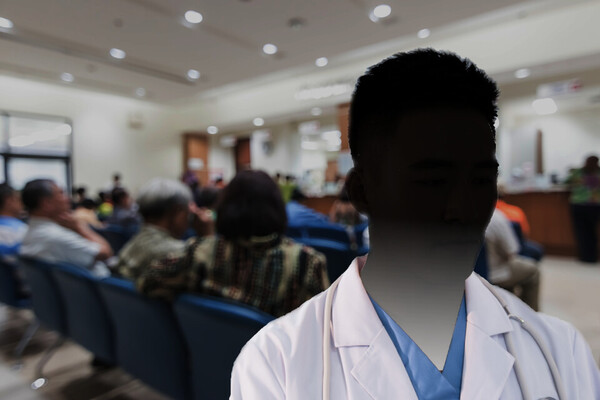The government's deployment of public health doctors and military surgeons to fill healthcare gaps in teaching hospitals has sparked confusion and dissatisfaction from day one.
Deployed public health and military doctors are upset because they are being treated poorly, including housing, and are forced to work 80 hours a week.

Since Monday, the government has dispatched 158 doctors—138 public health doctors and 20 military surgeons—to 20 training hospitals after minimal training. They were trained on Monday and Tuesday before being put into practice. The government is also considering sending an additional 200 doctors, given the medical situation.
However, from the first day of their deployment, dissatisfaction has been brewing among public health doctors. The newly deployed doctors said their opinions were unilaterally excluded from the work assignment process, and there is no specific notice about the scope of their immunity.
"Talking about the working environment, for instance, a hospital gave a room for four patients for a public health doctor’s lodge,” said Lee Sung-hwan, head of the Korean Association of Public Health Doctors, in a telephone interview with Korea Biomedical Review. “In addition, I’ve heard that some hospitals unilaterally notified them to work 80 hours a week."
Lee added that some hospitals excluded public health doctors from the decision-making process on work assignments and gave them instructions unilaterally, causing many complaints from dispatched physicians.
According to Lee, public health doctors are not covered by the Labor Standards Act because of their status as tenured civil servants. However, their work regulations stipulate that they can work eight hours of overtime per day, up to 100 hours per month.
"Government officials said they could issue such instructions by abusing public health doctors’ status as public servants," Lee said. "Based on the work regulations, they may be able to work 80 hours. However, it is problematic to tell them to work 80 hours from the first day."
Most importantly, he pointed out, these public health doctors don't know how they will be held legally responsible for their treatment practices.
"The biggest problem is that the scope of liability for the work of public health doctors has not been defined," Lee said. "Some training hospitals assigned public health doctors to perform spinal taps, saying interns do that. In other words, they were instructed to perform an invasive procedure."
According to Lee, some hospitals assign interns to do spinal taps while others do not. "I've heard that public health doctors who are general practitioners assigned to do spinal taps feel it burdensome because they have never done it before," he said.
He also noted that expanding the dispatch of public health doctors could lead to a greater void in regional healthcare. This is especially true if public health centers are closed due to a lack of public health doctors, further reducing access to healthcare for vulnerable residents.
"I heard that the public health doctors working at public health centers have been dispatched to be on call at the emergency rooms of regional medical centers," Lee said. "Medical centers have high work intensity and treat critically ill patients, so specialists are usually assigned first. However, seeing that a general practitioner was dispatched (to the emergency room), the principle of prioritizing specialists seems to be shaken."
Lee went on to say, "Many clinic-level public health centers where people in medically vulnerable areas can get medicine are closing down. They operate itinerant clinics but are closed because they cannot afford them. I am worried that the medical gap will grow if the dispatch is expanded."
Lee said his association plans to collect damage cases from dispatched public health doctors and prepare countermeasures. "We will collect cases of rights violations reported by public health officers in the field," he added.
Related articles
- Court to decide whether to suspend medical student increase as early as Friday this week
- Nurses are filling in trainee doctors from today. Here’s what they can and can’t do.
- Korea mobilizes over ₩200 billion per month to maintain emergency care
- After exodus of trainee doctors, cash-short hospitals scramble to borrow money
- Exodus of medical residents forces neurological society to cancel workshop
- SNU medical professors propose requesting foreign institute to forecast Korea's physician increase
- Korean trainee doctors seek ILO's intervention against government's work order mandate
- Emergency doctors group urges media not to stigmatize ERs unable to accept patients

